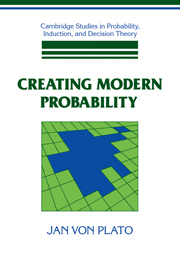Book contents
- Frontmatter
- Contents
- Preface
- 1 Introduction
- 2 Pathways to modern probability
- 3 Probability in statistical physics
- 4 Quantum mechanical probability and indeterminism
- 5 Classical embeddings of probability and chance
- 6 Von Mises' frequentist probabilities
- 7 Kolmogorov's measure theoretic probabilities
- 8 De Finetti's subjective probabilities
- Supplement: Nicole Oresme and the ergodicity of rotations
- Bibliography
- Index of Names
- Index of Subjects
1 - Introduction
Published online by Cambridge University Press: 05 June 2012
- Frontmatter
- Contents
- Preface
- 1 Introduction
- 2 Pathways to modern probability
- 3 Probability in statistical physics
- 4 Quantum mechanical probability and indeterminism
- 5 Classical embeddings of probability and chance
- 6 Von Mises' frequentist probabilities
- 7 Kolmogorov's measure theoretic probabilities
- 8 De Finetti's subjective probabilities
- Supplement: Nicole Oresme and the ergodicity of rotations
- Bibliography
- Index of Names
- Index of Subjects
Summary
WHAT THIS BOOK IS ALL ABOUT
The concept of probability plays a vital role in many sciences, in the theory and practice of scientific inference, and in philosophy and the modern world view more generally. Recent years have brought a number of articles and books dealing with the emergence of probabilistic thinking in the last century and the earlier part of this century. Several studies of the history of statistics appeared in the 1980s. One also finds accounts of the development of statistical physics, of quantum theory and of fundamental questions such as determinism and indeterminism in modern physics. But nothing comparable exists on modern probability, the mathematical discipline that in some way or other is at the basis of any related studies. With the main focus on the shift from classical to modern probability in mathematics, I have attempted to combine in this book a historical account of scientific development with foundational and philosophical discussion.
Classical probability formed a chapter in applied mathematics. Its bearing on the larger questions of science and philosophy was limited. The shift to modern probability started around the turn of the century. By the late 1930s probability theory had become an autonomous part of mathematics. The developments of these early decades have been over-shadowed by the nearly universal acceptance of modern axiomatic and measure theoretic probability as embodied in the classic work of Andrei Kolmogorov of 1933, Grundbegriffe der Wahrscheinlichkeitsrechnung.
- Type
- Chapter
- Information
- Creating Modern ProbabilityIts Mathematics, Physics and Philosophy in Historical Perspective, pp. 1 - 26Publisher: Cambridge University PressPrint publication year: 1994

